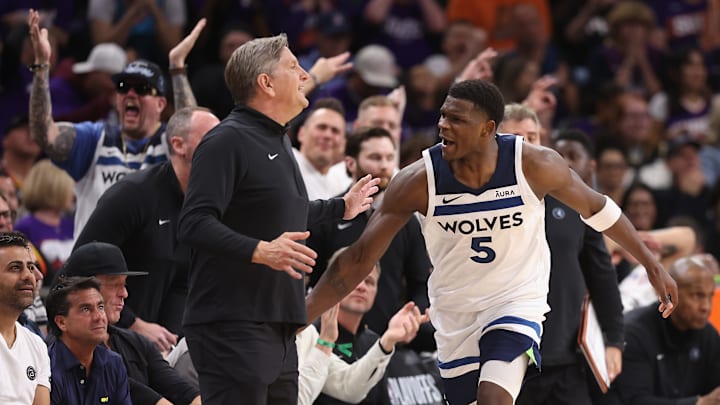On February 22nd, 2021 Chris Finch took over as the Minnesota Timberwolves' Head Coach after multiple playoff-less seasons, something long associated with the franchise. This followed a disappointing run with Ryan Saunders on the sideline, son of legendary Wolves coach Flip Saunders.
Despite some optimism about a coach well-liked by the players, Saunders only accumulated a 43-94 record in his tenure as the shot-caller. With Anthony Edwards amid an impressive rookie campaign, the organization didn't want to hinder his development, as seen with recent lottery picks.
When speaking about draft picks who underperformed before Finch’s arrival, combo guard Kris Dunn and wing Jarrett Culver come to mind.
Dunn came into the league regarded as someone who could immediately have a role within the team, as the Wolves were looking for their guard of the future. Unfortunately, that never happened in Minnesota, averaging a measly 3.8 points, 2.4 assists, and 2.1 rebounds while shooting 38% from the field and 29% from three. Dunn only spent one year in the Twin Cities before being involved in a blockbuster trade on the day of the 2017 draft to acquire then Chicago Bulls All-Star, Jimmy Butler.
Jarrett Culver was another prospect considered NBA-ready, with plenty of room to grow. Similar to Dunn, Culver was never able to develop a consistent jumper at the NBA level. Culver was traded after a short stint with the Wolves, being shipped out alongside Juancho Hernangomez for the animated Patrick Beverley.
A shift in mentorship
You may be wondering how this is relevant to Finch. Well, it's rather simple; player development has been much better under his guidance. Anthony Edwards, two-way wing Jaden McDaniels, and fan favorite big Naz Reid are all benefactors of Finch’s coaching style.
Most reading this will remember Edwards was taken with the first pick of the 2020 NBA draft. The young superstar has an elite work ethic to have developed into the player we see today, but a certain amount of credit has to go to Finch.
Finch has established a reputation as a no-nonsense coach who doesn't play favorites, an advantageous approach when mentoring young athletes. After the Wolves’ Game 7 victory over the Denver Nuggets, Edwards showed his respect for the man in charge.
“He's just a great coach and he don't sugarcoat anything with anybody." Edwards said during the postgame press conference, " If KAT's f---ing up he's gonna get on KAT, if I'm f---ing up, he's gonna get on me ... no matter how high the player is on the pole."
Unlike Edwards, McDaniels was a late first-round pick, taken 28th overall by the Lakers before being dealt to the Wolves. Drafted the same year as Ant, McDaniels has far exceeded his pre-draft expectations. Blossoming into a true two-way force, McDaniels signed a lofty five-year, $136M contract extension in October 2023.
History beckons
Naz Reid has brought moments of joy to any Timberwolves fan, and luckily he's got the shine he deserves under Finch. A five-star recruit coming out of high school, Reid took his talents to LSU to play collegiate ball. Reid had a solid year for the Tigers, yet went undrafted in 2019.
Fortunately, the Timberwolves recognized his talents and brought on Big Jelly, who was just named the 2023-24 NBA Sixth Man of the Year. Despite the Wolves having one of the largest frontcourts in the league, the talented two-way force has been able to solidify a key role within the squad.
The information provided above only scratches the surface of the impact Finch has made on the franchise. He has already solidified himself as one of the best coaches in Timberwolves history. The former G-League coach has a 160-127 record in the regular season, which is the second most wins in franchise history, with a win rate of 56%. Additionally, he holds the best postseason record at 12-15, winning 44% of the playoff games he's been involved in.
The late, great Flip Saunders won 411 games, the most in franchise history, and lost 326 games, giving him a 56% winning record. He coached 47 playoff games, winning 17 of them. On the other hand, Finch has coached 27 playoff games and won nearly half of them, hopefully with more to come.
Coming off the heels of a 56-26 season, second-best all-time and best since 2003-04, the future looks bright with Finch at the reins.
